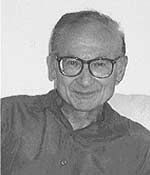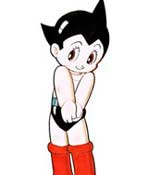
by Gerry Poulos
If Osamu Tezuka is the God of Comics, fathering the popularity of comics in Japan and creating the first animated television series in Japan based on his creation, Testuwan Atom, then Fred Ladd is its favorite uncle, rearing the child in a foreign environment, America. An Ohio State University graduate with an emphasis in Radio and TV, Ladd edited and dubbed Testuwan Atom for American consumption and released it through NBC in 1963 as Astro Boy. He has since been working with anime in America from Speed Racer through Sailor Moon. In light of Manga Entertainment's new video release of Astro Boy, Dark Horse Comics upcoming reprint of the classic manga, and Sony's impending TV series and computer animated feature film, Akadot sat down with Ladd to learn the origins of Astro Boy. How did Astro Boy come to the American market? Fred Ladd: There was an NBC rep [in Japan] and he happened to have the TV set on in his hotel room, it was early in 1963, and he just happened to catch this crazy animation. It reminded him a little of Pinocchio and Mickey Mouse, and he says, "What the heck is this?" Now at that time there was no animation industry in Japan, they were importing animation from other places, mostly from the states. So he looked into it and found out it was called Tetsuwan Atom and it was a Japanese animation, so he called back to NBC who said, "Call Fred Ladd." I was at the time working on a picture called Pinocchio in Outer Space. It was an original picture and I was in New York. I was working a lot with Peter Fernandez (Speed Racer); the animation was being done in Europe. I had already dubbed several hundred European made cartoons in a six-minute form, so I was the logical guy for them to call.
At first I said I don't know. Let me study it a little bit. So I got back to them and I said it's not like Pinocchio as it first appeared. Pinocchio didn't know right from wrong but this little guy does. And, he fights crooks and he fights crime when the stupid police can't make it. So we made a couple of pilots [made from episodes] numbers one and three. Peter Fernandez did the writing on the second part because I was busy with other things. So I set the stage for the script and Peter finished it and we took it into the studio. We [combined the episodes] because the first part had so much exposition in it that there was too little time for action. They were introducing the characters. There was so little action I thought if I were a station or buyer, I'm not sure I would spring for this. So we backed it up with number three, "Expedition to Mars." Now this was 1963 when the race for space was still very hot. The Apollo didn't exist yet in those days. The second show had almost no exposition and was almost all action; it was good action and it was space action, the hot ticket in those days. We put the two shows back-to-back and made an almost hour long demo that the NBC guys took out to see if it would sell. The rest as they say is history. They went for 104 half hour [episodes] in English out of a total of 193 made in Japan. |
||||||||


